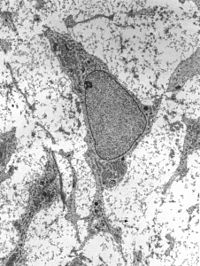
Photo from wikipedia
B10 cells, a specific subset of regulatory B cells, are capable of regulating immune response and restricting inflammation and autoimmune disease progression by producing IL-10. B10 cells frequently change significantly… Click to show full abstract
B10 cells, a specific subset of regulatory B cells, are capable of regulating immune response and restricting inflammation and autoimmune disease progression by producing IL-10. B10 cells frequently change significantly during inflammation and autoimmunity. However, how B10 cell populations change in viral myocarditis (VMC) remains unclear. Therefore, this work was conducted to clarify the changes in B10 cells and their potential mechanisms. Our results showed that the B10 cell frequency significantly changed in the VMC model. Changes in prostaglandin E2 (PGE2) levels in VMC model hearts were consistent with B10 expansion. PGE2 induced B10 cell expansion via the MAPKs/AKT-AP1 axis or AhR signaling. Additionally, PGE2-pretreated B10 cells inhibited naïve CD4+ T cell differentiation into Th17 cells. In vivo, PGE2 treatment or adoptive B10 cell transfer significantly restricted VMC development. Our results provide sufficient evidence that PGE2-induced B10 cell expansion may become a promising therapeutic approach for VMC and acute inflammatory injury.
Journal Title: Cellular immunology
Year Published: 2019
Link to full text (if available)
Share on Social Media: Sign Up to like & get
recommendations!